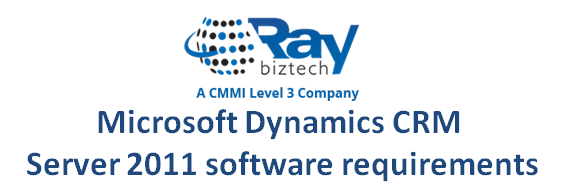Microsoft Dynamics CRM Server 2011 software requirements

This section lists the software and application requirements for Microsoft Dynamics CRM Server 2011.
Windows Server operating system:
Microsoft Dynamics CRM Server 2011 can be installed only on Windows Server 2008 (x64 versions)-based computers. The specific versions and editions of Windows Server that are supported for installing and running Microsoft Dynamics CRM Server 2011 are listed in the following section.
Supported Windows Server 2008 editions:
The following editions of the Windows Server 2008 operating system are supported for installing and running Microsoft Dynamics CRM Server 2011:
Windows Server 2008 Standard SP2 (x64 versions) or Windows Server 2008 Standard R2
Windows Server 2008 Enterprise SP2 (x64 versions) or Windows Server 2008 Enterprise R2 Windows Server 2008 Datacenter SP2 (x64 versions) or Windows Server 2008 Datacenter R2
Windows Web Server 2008 SP2 (x64 versions) or Windows Web Server 2008 R2
Windows Small Business Server 2008 Premium x64
Windows Small Business Server 2008 Standard x64
Windows Small Business Server 2011 Standard
Windows Small Business Server 2011 Essentials
Server virtualization:
Microsoft Dynamics CRM servers can be deployed in a virtualized environment by using Windows Server 2008 with Hyper-V or virtualization solutions from vendors who participate in the Microsoft Windows Server Virtualization Validation Program (SVVP). You must understand the limitations and best practices of server virtualization before you try to virtualize your installation of Microsoft Dynamics CRM. For information about Hyper-V, see the Microsoft Virtualization Web site.
Active Directory modes:
The computer on which Microsoft Dynamics CRM 2011 is running must be a domain member in a domain that is running in one of the following Active Directory directory service domain modes:
Windows 2000 Mixed
Windows 2000 Native
Windows Server 2003 Interim
Windows Server 2003 Native
Windows Server 2008 Interim
Windows Server 2008 Native
All Active Directory forest modes are supported. For more information about Active Directory domain and forest modes, see the Active Directory Domains and Trusts Microsoft Management Console (MMC) snap-in Help.
Internet Information Services (IIS)
We recommend that you install and run IIS 7.0 or IIS 7.5 in Native Mode before you install Microsoft Dynamics CRM Server 2011. However, if IIS is not installed and it is required for a Microsoft Dynamics CRM server role, Microsoft Dynamics CRM Server Setup will install it.
SQL Server editions
Any one of the following Microsoft SQL Server editions is required and must be installed on Windows Server 2008 (x64 SP2 or R2) versions, running, and available for Microsoft Dynamics CRM:
Microsoft SQL Server 2008, Standard Edition, x64 SP1 or R2
Microsoft SQL Server 2008, Enterprise Edition, x64 SP1 or R2
Microsoft SQL Server 2008 Datacenter x64 SP1 or R2
Microsoft SQL Server 2008 Developer x64 SP1 or R2 (for non-production environments only)
*Microsoft SQL Server 2012, Enterprise
*Microsoft SQL Server 2012, Business Intelligence
*Microsoft SQL Server 2012, Standard
Claims-based authentication and IFD requirements
The following items are required or recommended for Internet-facing deployment (IFD). This topic assumes you will be using Active Directory Federation Services 2.0 as the security token service (STS). For more information about configuring Microsoft Dynamics CRM for claims-based authentication, download the Claims-based Authentication White Paper from the Microsoft Download Center.
The computer where Microsoft Dynamics CRM Server 2011 is installed must have access to a security token service (STS) service, such as Active Directory Federation Services 2.0 federation server.
Note the following conditions for the Web components before you configure IFD:
If you are installing Microsoft Dynamics CRM in a single server configuration, be aware that Active Directory Federation Services 2.0 installs on the Default Web Site. Therefore, you must create a new Web site for Microsoft Dynamics CRM.
When you run the Internet-Facing Deployment Configuration Wizard, Microsoft Dynamics CRM Server 2011 must be running on a Web site that is configured to use Secure Sockets Layer (SSL). Microsoft Dynamics CRM Server Setup will not configure the Web site for SSL.
We recommend that the Web site where the Microsoft Dynamics CRM Server 2011 Web application will be installed has the “Require SSL†setting enabled in IIS.
The Web site should have a single binding. Multiple IIS bindings, such as a Web site with an HTTPS and an HTTP binding or two HTTPS or two HTTP bindings, are not supported for running Microsoft Dynamics CRM.
Access to the Active Directory Federation Services 2.0 federation metadata file from the computer where the Configure Claims-Based Authentication Wizard is run. Note the following:
The federation metadata endpoint must use the Web services trust model (WS-Trust) 1.3 standard. Endpoints that use a previous standard, such as the WS-Trust 2005 standard, are not supported. In Active Directory Federation Services 2.0, all WS-Trust 1.3 endpoints contain /trust/13/ in the URL path.
Encryption certificates. The following encryption certificates are required. You can use the same encryption certificate for both purposes, such as when you use a wildcard certificate:
Claims encryption. claims-based authentication requires identities to provide an encryption certificate for authentication. This certificate should be trusted by the computer where you are installing Microsoft Dynamics CRM Server 2011 so it must be located in the local Personal store where the Configure Claims-Based Authentication Wizard is running.
SSL (HTTPS) encryption. The certificates for SSL encryption should be valid for host names similar to org.contoso.com, auth.contoso.com, and dev.contoso.com. To satisfy this requirement you can use a single wildcard certificate (*.contoso.com), a certificate that supports Subject Alternative Names, or individual certificates for each name. Individual certificates for each host name are only valid if you use different servers for each Web server role. Multiple IIS bindings, such as a Web site with two HTTPS or two HTTP bindings, is not supported for running Microsoft Dynamics CRM. For more information about the options that are available to you, contact your certificate authority service company or your certificate authority administrator.
The CRMAppPool account of each Microsoft Dynamics CRM website must have read permission to the private key of the encryption certificate specified when configuring claims-based authentication. You can use the Certificates snap-in to edit permissions for the encryption certificate found in the Personal store of the local computer account.
SQL Server Reporting Services: Specific Microsoft SQL Server Reporting Services editions are used for reporting functionality.
Any one of the following Microsoft SQL Server editions is required and must be installed on Windows Server 2008 (x64 SP2 or R2) versions, running, and available for Microsoft Dynamics CRM:
Microsoft SQL Server 2008, Standard Edition, x64 SP1 or R2
Microsoft SQL Server 2008, Enterprise Edition, x64 SP1 or R2
Microsoft SQL Server 2008 Datacenter x64 SP1 or R2
Microsoft SQL Server 2008 Developer x64 SP1 or R2 (for non-production environments only)
*Microsoft SQL Server 2012, Enterprise
*Microsoft SQL Server 2012, Business Intelligence
*Microsoft SQL Server 2012, Standard
Software component prerequisites: The following SQL Server components must be installed and running on the computer that is running SQL Server before you install Microsoft Dynamics CRM Server 2011:
SQL word breakers: This is only required for some Microsoft Dynamics CRM language editions. For more information about word breaker versions for languages supported by SQL Server see Word Breakers and Stemmers.
SQL Server Agent service
SQL Server full-text indexing
The following components must be installed and running on the computer where Microsoft Dynamics CRM Server 2011 will be installed:
Services
Indexing Service
To install this service, see the Windows Server documentation.
IIS Admin
World Wide Web Publishing
Windows Data Access Components (MDAC) 6.0 (This is the default version of MDAC with Windows Server 2008.)
Microsoft ASP.NET (Must be registered, but does not have to be running.)
Verify prerequisites
Before you install Microsoft Dynamics CRM Server 2011, you should understand the following:
Microsoft SQL Server can be, but is not required to be, installed on the same computer as Microsoft Dynamics CRM Server 2011.
If Microsoft Dynamics CRM Server 2011 and Microsoft SQL Server are installed on different computers, both computers must be in the same Active Directory directory service domain.
Microsoft SQL Server can be installed by using either Windows Authentication or mixed-mode authentication. (Windows Authentication is recommended for increased security and Microsoft Dynamics CRM will use only Windows Authentication).
The service account that SQL Server uses to log on to the network must be either a domain user account (recommended) or the Local System Account. Installation of Microsoft Dynamics CRM will fail if the SQL Server service account is the local administrator.
The SQL Server service must be started and can be configured to automatically start when the computer is started.
The Microsoft SQL Server Reporting Services service must be started and configured to automatically start when the computer is started.
The SQL Server Agent service must be started. This service can be configured to automatically start when the computer is started.
Although it is optional, we recommend that you accept the SQL Server default settings for Collation Designator, Sort Order, and SQL Collation. Microsoft Dynamics CRM supports both case-sensitive and case-insensitive sort orders.
Microsoft Dynamics CRM Server Setup requires at least one network protocol to be enabled to authenticate by using SQL Server. By default, TCP/IP protocol is enabled when you install SQL Server. You can view network protocols in SQL Server Configuration Manager.

